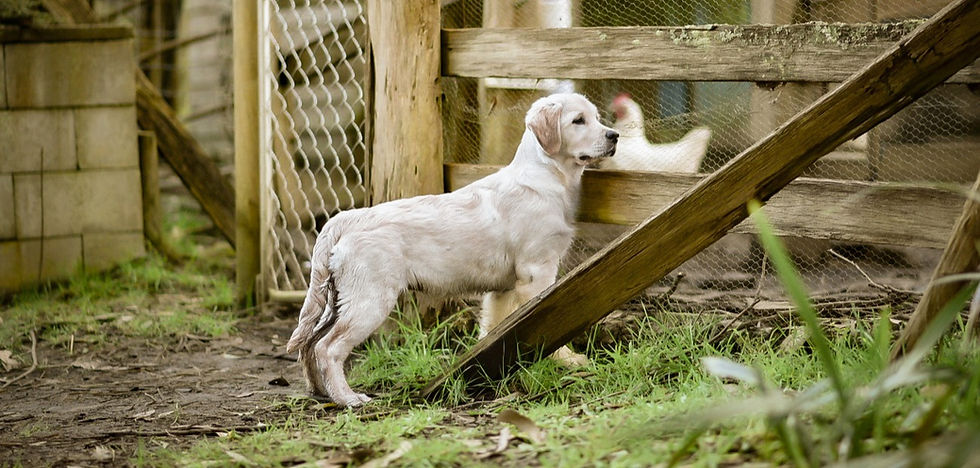Early Socialisation
- Caitlin Greenwood

- Feb 27, 2025
- 3 min read
The following content is from our very own puppy training handbook - "Puppy Pathways" by Mayleigh Manners
Socialisation
Raising a Well-Adjusted Dog
Everyone dreams of having a well-behaved adult dog — a joy to live with, can accompany you everywhere, and handles the world around them with ease. Achieving this requires effort, but starting early makes the process smoother and more rewarding. But this doesn’t come easily; we need to put a lot of energy and time into our puppies to prepare them for success.
Early Socialisation is Key
The first 16 weeks of a puppy’s life are critical for their development. This is when their experiences leave lasting impressions, shaping how they perceive the world as adults. For instance, a puppy exposed to crying babies during this window is likelier to remain unfazed by the sound later in life.
Socialisation means exposing your puppy to various experiences in a positive and controlled manner. Introduce them to different dogs, people, sounds, smells, sights, surfaces, and environments such as machinery or busy streets – just to name a few!
How to Socialise Your Puppy
Go at Their Pace: Avoid overwhelming or forcing your puppy into situations they’re frightened of. Instead, introduce new experiences gradually and positively. For example, if your puppy is fearful of thunderstorms, play a thunderstorm soundtrack at a very low volume and slowly increase the volume as they remain calm. Another example may be that they’re scared of a Halloween decoration at the store. Instead of dragging your puppy up to it, gently encourage them to interact with it at their own pace. You can reward calm behaviour and use treats as encouragement.
Create Positive Associations: Reward calm and confident behaviour with treats and praise. For example, if your puppy notices another dog and remains relaxed, reward them immediately.
Avoid Coddling Fear: Comforting a frightened puppy excessively can reinforce their fear. Instead, remain calm, step back to a distance where they feel safe, and reward their calm behaviour.
Where to Take Your Puppy
While your puppy isn’t fully vaccinated, avoid high-risk areas like public grassy spaces frequented by dogs (to reduce the risk of transmittable diseases). It's best to avoid public dog-drinking bowls at this time. However, there are still plenty of safe places to expose them to the world, such as:
Pet-friendly hardware stores (like Bunnings)
Pet stores
Puppy school
Cafes
Outside supermarkets, near trolley bays
School pickup/drop-off zones
Bus stops
Homes of friends or family with vaccinated, friendly dogs
Wherever you can safely take your puppy, do it! The goal is to expose them to as many positive experiences as possible during this critical stage. Find more ideas on our puppy socialisation checklist.
Handling and Grooming
Your puppy won’t only interact with you — vets, groomers, and even strangers may need to handle them. Teaching your puppy to be comfortable with touch is vital.
Practice Handling: Regularly touch and gently handle their paws, ears, and mouth. Pair this with treats to create a positive association.
Introduce Grooming: Brush your puppy, trim their nails, and check their teeth as part of their routine. A relaxed, cooperative dog during grooming is a joy for everyone involved!
Understanding Fear Periods
Puppies go through natural fear periods, typically around 8–11 weeks and again at 6–14 months. During these times, they may become unusually sensitive or fearful of things they previously ignored — sometimes logical, other times completely random.
During fear periods:
Stay calm and patient.
Avoid punishing or overreacting to their fears.
Gradually reintroduce the stimuli in a positive and non-threatening way.
Consistency and Patience Leads to Success
Socialising your puppy is about setting them up for a lifetime of confidence and resilience. With consistent effort and a focus on positive experiences, you’ll raise a dog who thrives in various environments and is a delight to share your life with.
You should limit stressful situations during these times to prevent your puppy from having a bad experience, as these frightening experiences can stick with them for life. This period of a puppy's life might feel daunting – particularly if it is your first. But it’s also a time of joy, fun, adventure and bonding with your new family member!




Comments